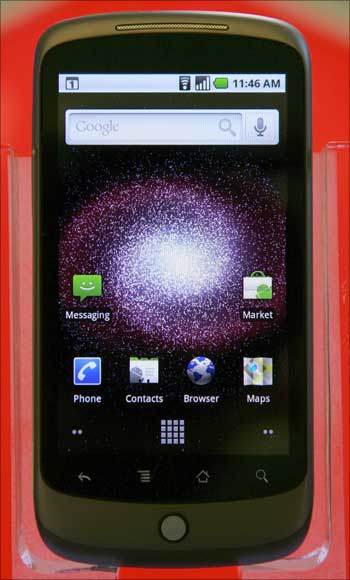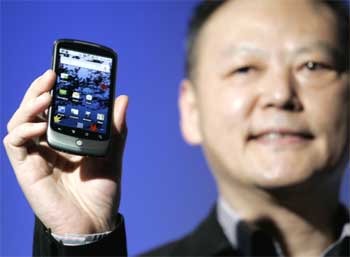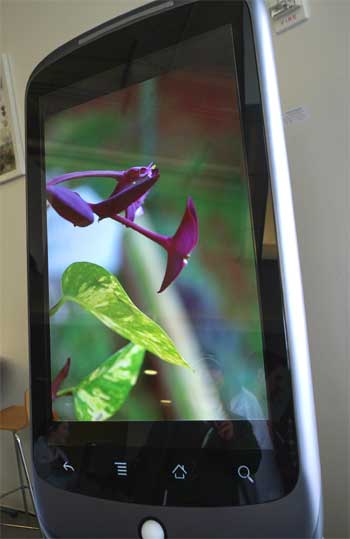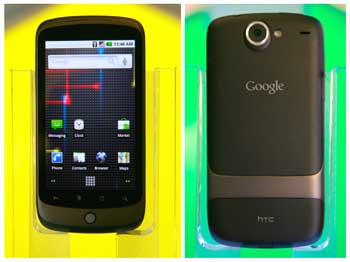
Search giant Google, with its proven habit of teasing Internet users, has done it again. After nearly three years of speculation over whether it will manufacture its own phone and retail it, Google has launched what it calls a "super phone" (as opposed to a smartphone).
Christened "Google Nexus One", the handset has been made by Taiwan-based HTC while the software platform is its own - Android 2.1. The phone will initially be available only in countries like the US, the UK, Hong Kong and Singapore (not in India currently).
Customers can purchase the phone from the "Google webstore" at google.com/phone.
The unlocked version in the US is priced at $530 (approximately Rs 24,300) while the phone costs $179 (approximately Rs 8,200) with a T-Mobile contract (the telco-driven model which subsidises the handset price). ...

Explaining the term "Nexus One", Mario Queiroz, vice-president of product management at Google, said during a late night webcast: "Nexus means a point of convergence. This is where the Web meets the phone."
The announcement, which was the most anticipated phone since that of Apple's iPhone, was perfectly timed to pre-empt many of the significant announcements planned for this week's annual Consumer Electronics Show in Las Vegas, according to Jim McGregor, chief technology strategist of In-Stat.
"A question we asked ourselves some time ago was what if we work even more closely with our partners to bring devices to market which are going to help us showcase quickly the great software technology we're working on here at Google," said Queiroz, adding: "We've done just that."
The device does not disappoint.
It has a 3.7-inch OLED 800 x 480 display (iPhone's has a 3.5-inch, 480 x 320 offering, and OLED screens are brighter and more colour-rich than TFT-LCD screens) and runs a 1 GHz Snapdragon processor from Qualcomm. (The Motorola Droid, for comparison, has a 550-MHz ARM Cortex-A8 processor while the iPhone 3GS runs on a 600-MHz chip.)
The Nexus One also has twice the RAM of the Droid or the iPhone, with 512 MB on-board. ...

The device is 11.5 mm thick, and weighs just 130 grams (Google compares it to a Swiss knife. The iPhone is 12.3 grams and weighs 135 grams). It has a metal bezel (which surrounds the phone) that can be customised when purchasing the device. For instance, one can engrave: "Happy Birthday" and gift it to a dear one.
Nexus One has a 5-megapixel camera which includes an LED flash and takes MPEG 4 videos. The device also has a trackball which pulses light to alert users of events like new emails or SMSes.
The phone also has light and proximity sensors, besides a compass and accelerometer. The light sensor will automatically dim the display when a bright light is not needed.
The proximity sensor also dims the display light when a user moves the phone to the ear to talk. The phone has two microphones - one in the front and one at the back - enabling noise cancellation (especially useful if you're in a noisy place). ...

The software, Android version 2.1, builds on Android 2.0, and users can place widgets across five home screens instead of three. Android 2.1 voice enables every text field in the device.
That means users can speak Twitter messages, Facebook posts and email messages and the phone will convert them to text to send.
Nexus One also includes a 3D photo gallery and live wallpapers (the background images sit behind widgets, and are animated. For instance, Quieroz gave a demo of a photo of a small lake with leaves floating in the water. Touching it created ripples on the water). The device also supports popular Google applications such as Gmail, Google Voice and Google Maps Navigation.
The building market momentum behind Android is unmistakeable. "In-Stat believes new OSs such as Android will cut away at Symbian's market share," says Allen Nogee, In-Stat analyst.
"Although there are relatively few open source OS-based smartphones in the market today, the open source OS momentum is difficult to ignore. After years of hype, it is easy to see that 2010 will be the year of Android."

In-Stat believes the stakes are high. Gone are the days when the basis of competition was solely defined by hardware. Software is becoming the key in determining the user experience.
If, however, a particular OS does not garner developer support, then the result could be disastrous, according to In-Stat analysts.
Google, say analysts, has also upset telcos which cut three-way deals with phone makers and operating system vendors to sell phones exclusively on their network. They attempt to sign-up users with two-year contracts and data services.
However, Google, on its part, offers carrier-independent models, too, which implies that telcos would have to compete on pricing and the quality of their networks rather than exclusive deals for hot phones.